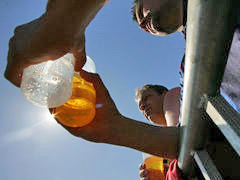Beer in College Football Stadiums – Is It Good or Bad?

In this football scoreboards feature, I will discuss the pros and cons of selling beer at college stadiums.
Roughly 35 out of 120 NCAA Division 1 schools currently allow the sales of beer to take place in their stadiums. However, many of these are limited to club-seating areas, clubs, and luxury suites. In other cases, the entire stadium will have access to beer, because it is the local sports authority that owns the facility or the city or state, and the alcohol policy is established by that body, not the school itself. A lot of colleges already have problems with underage drinking, so they frown upon having beer sold at their stadiums.
On the one hand, because the economy is reducing government coffers, school administrators, as well as city leaders, must think of ways to find new income, without having to impose fees or increase taxes. For example, in the city of Memphis, which does not advocate any sales of beer whatsoever, $260,000 is annually lost on operating the Liberty Bowl. This number doesn’t even include the required $1 million or more for capital improvement. Therefore, revenue from beer sales at college football stadiums could at least somewhat help cover those costs.
Of course, on the other hand, beer sales bring about a whole other set of problems. Violence that erupts as a result of public drunkenness is a big one, especially when the football scoreboards are not showing desired results. In 1996, drunken fans at the University of Colorado in Boulder caused violent disruption, which banned the sales of beer in all of the stadium’s areas except club seats and luxury suites. Since then, a number of colleges have banned alcohol-related advertising at their stadiums, including the University of Wisconsin in Madison.
Basically, it is a delicate balance for cities and colleges to try and achieve. They want to get the revenue, but they don’t want underage students being under the influence. Some schools are attempting to reach that balance by putting a strict policy in place, which will demand that everyone show ID when purchasing beer. Others are selling beer in clear cups only, so that it is easier to monitor for security officers.
In some schools, selective beer sales have not worked. For example, in Minneapolis’ University of Minnesota, beer was only sold to premium-seat holders. Later on, however, the lawmakers decided that this was not fair treatment to the rest of the fans and argued that equal treatment should be maintained throughout the stadium. When ‘all or nothing’ was made law, the Board of Regents at the university decided on ‘nothing’ and banned beer sales completely for the whole stadium. The result? A number of suite-holders ended up returning their tickets, and overall, the beer ban is estimated to have cost about $1 million in potential revenue.
The conclusion? It’s a tough one, but a strict ID policy and selective sales seem to be the most viable options for stadiums to reach that balance between order and revenue.
For more information on beer at college stadiums, go to:
//online.wsj.com/article/SB125271416817105157.html


